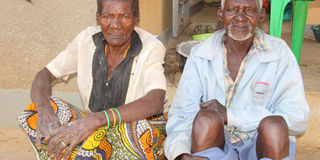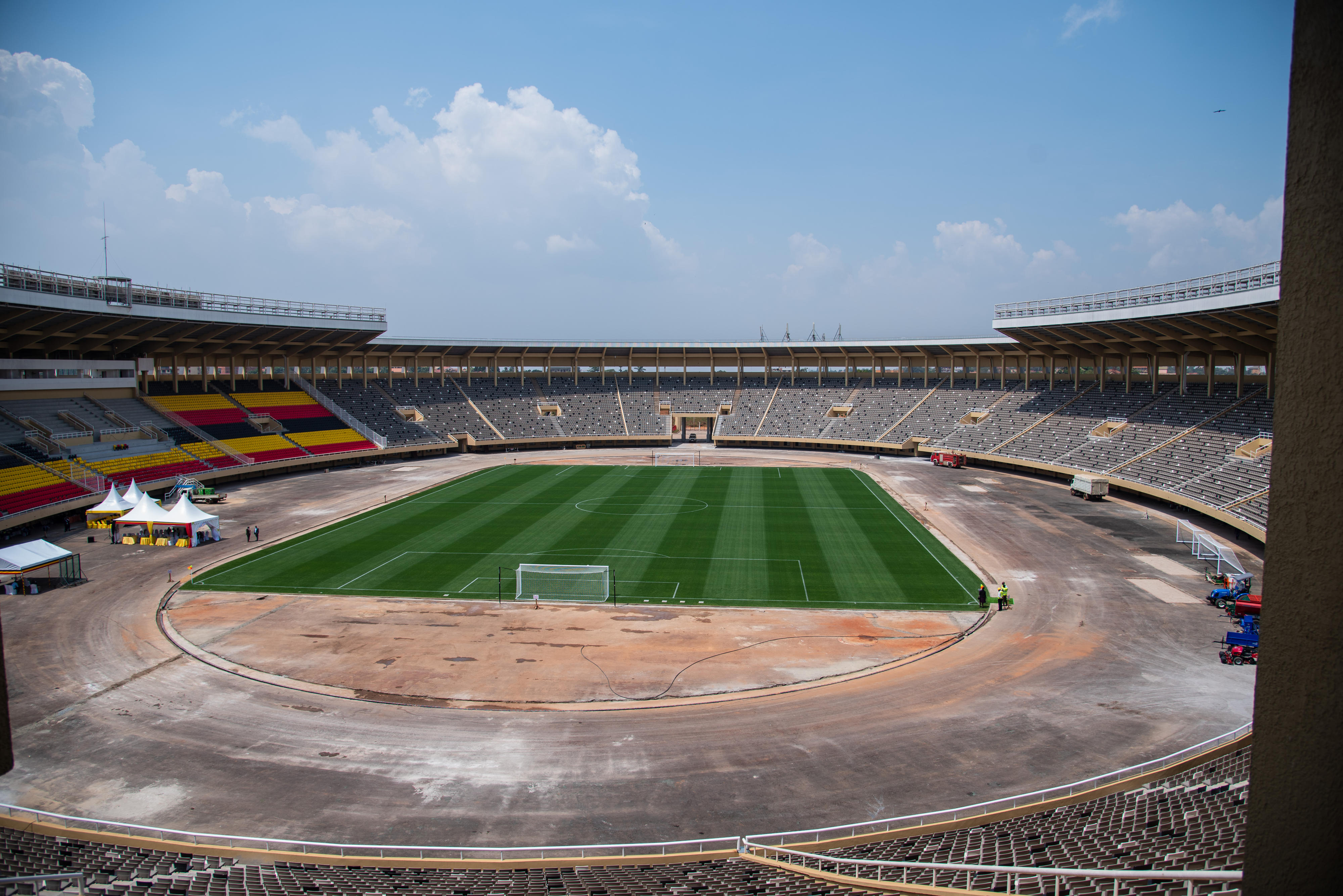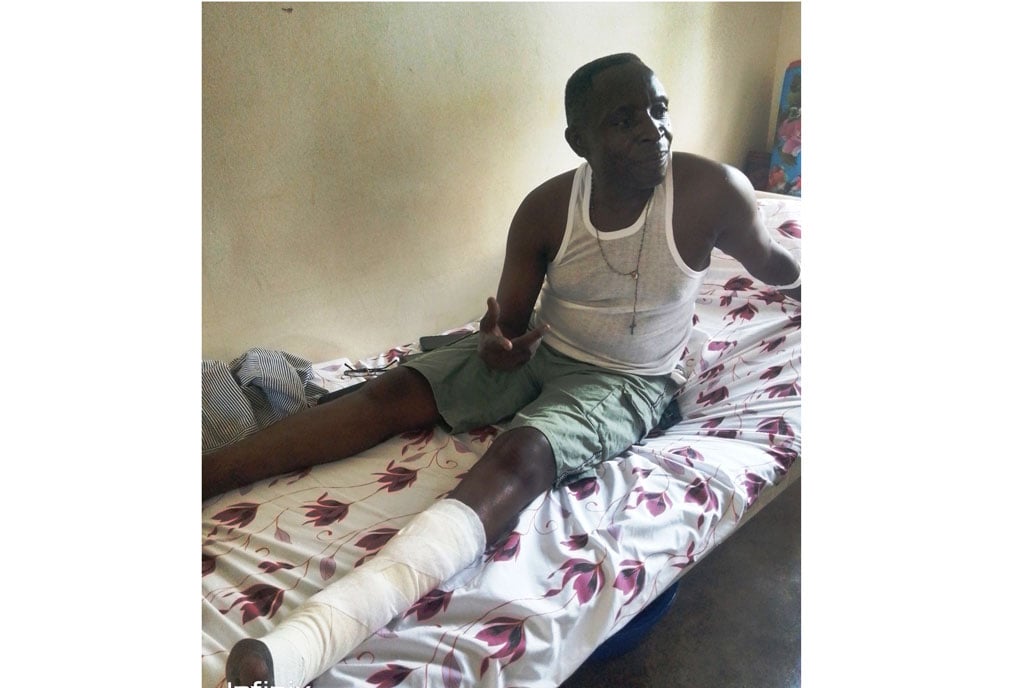How families displaced by oil refinery are struggling to cope

Resettled. Ms Angelina Ayenya and her husband Midal Okura, who have been resettled by government in Kyakabooga Village, Hoima District. PHOTO BY FRANCIS MUGERWA.
What you need to know:
- Out of 2,752 property owners, 2,680 asked for cash compensation and 2,662 property owners received their cash compensation.
- However, three property owners declined to sign for their compensation on grounds that their properties were undervalued while 15 have never turned up for disclosure where they can choose either to be resettled or receive cash compensation.
Hoima. It is a bright sunny morning in Kyakabooga Village, Buseruka Sub-county in the oil-rich district of Hoima, western Uganda.
Seated on her veranda, Ms Angelina Ayenya, 69, holds a pestle while pounding cassava in a mortar next to her 80-year-old husband, Mr Midal Okura.
“Hold on until I finish preparing lunch for my husband,” Ms Ayenya says after my request for an interview.
The elderly couple is among the 46 families government relocated from a 29-square kilometre piece of land in Kabaale Parish in Buseruka Sub-county which has been gazzeted to host the proposed oil refinery.
Mr Okura, who has lived with Ayenya since 1962 with whom they are blessed with eight children and seven grandchildren, has always wanted to wed his wife but failure to have a permanent house stood in his way to achieve his dream.
Mr Okura’s family, just like the other 45 families that have been resettled in Kyakabooga Village, received a three-bed roomed house that has a sitting room, a shower room, an outside kitchen, two pit latrines and a 500-litre tank of water.
“When I settled here in my new (permanent) home, I decided to wed my dear wife,” Mr Okura says with a smile.
Prior to resettling in Kyakabooga Village, Mr Okura resided in Kyapuloni Village in Buseruka Sub-county where he had a 15-acre piece of land.
He used to cultivate crops and rear domestic animals as a source of his livelihood. He got a house and an equivalent piece of land in Kyakabooga Village.
Land in Kyapuloni was more fertile than here, Okura says.
“The problem with rearing goats here is that they are either stolen or you quarrel with neighbours when they stray in their courtyard,” Mr Okura adds.
However, other families that have been resettled in Kyakabooga have mixed feelings.
Uncomfortable
Mr Richard Okumu, a father of 13 was excited to relocate from Nyahaira Village to Kyakabooga Village in April.
But when he arrived at the resettlement house, it could not comfortably accommodate his family.
“The toilets are near the house and kitchen,” he complains.
He says the neighbours’ houses are less than 10 metres apart thus no privacy.
“I decided to abandon the house and set up a makeshift within my land so that I have some privacy and minimise on conflicts with my neighbours,” he says.
Mr Richard Orebi, the chairman of the oil refinery affected residents relocation committee, says the families were adequately consulted on the physical plans of the houses but the resettlement houses were not built in each person’s land as agreed by the families and the Ministry of Energy technocrats.
“We had wanted government to build a house in each family land in a setting that is similar to how we used to live in our villages. They instead built a settlement which is like a town,” Mr Orebi says.
The resettlement plan, which the ministry of Lands designed for Kyakabooga Village, includes a public cemetery, a community centre, open spaces, a police post, commercial centre and access roads.
According to Mr Francis Elungat, a Lands officer in the Ministry of Energy, who was part of the Resettlement Action Plan (RAP) implementation team, with consent of the affected families, 46 modern housing units were constructed and the remaining piece of land was earmarked for farming, public amenities and economic activities.
Ms Faustin Tumuhairwe, a single mother of four, who used to stay in Kyapuloni Village in a mud and wattle house on her one acre piece of land says she accepted to resettle after government promised her a permanent house in Kyakabooga Village.
“Life here is better. I used to live in a grass thatched house. I have a permanent house with a standard toilet and kitchen,” she says with pride.
Ms Tumuhairwe, a farmer, however observes that land in Kyapuloni Village used to retain water and she would grow crops almost throughout the year but the case is different as soil in Kyakabooga Village is not fertile.
The resettled families are struggling to access water for their domestic use. “We use one borehole which at times stops producing water,” she says.
The families brave long queues before accessing water and some spend three to five hours before fetching water from a source that is also used by the surrounding communities.
While she is comfortable living with neighbours, Ms Tumuhairwe complains that one iron sheet on her house is leaking and part of the paint on her house is peeling off.
Missing village life
Mr Innocent Tumwebaze, who had a 4.5 acre piece of land in Nyahaira Village, says he misses a market that was next to his house and his village friends.
“Here we have found new people. Everyone minds his or her own business,” he says.
He says many youth in the neighbouring villages are unemployed and they want to cultivate on the land which government bought for the resettled families.
“When you tell them that you also need to use the land, they get angry. They claim that we are being pampered by government which offered us land, houses and cows,” Mr Tumwebaze says.
The resettled families travel about five kilometres to Buseruka Health Centre III to access medication.
Mr Allan Kalangi, the sustainability school manager at the National Association of Professional Environmentalists (NAPE), an environmental and oil advocacy non-governmental Organisation, says since 2012, government has had adequate time to construct resettlement houses, put the required infrastructure as well as implement livelihood restoration programmes.
According to Mr Kalangi, government should have involved the Project Affected Persons (PAPS) from the beginning so that the resettlement site does not cause people to lose their previous lifestyle and livelihoods.
“If you built [housing] quarters for a community that used to stay in a village setting, the PAPS may not appreciate it and government may not achieve its intended objectives,” Mr Kalangi says.
He says it is embarrassing for houses commissioned last year to be leaking and paint peeling off.
However, Mr Kosea Wambaka, the director of Strategic Friends International (SFI), the company which government contracted to implement the Resettlement Action Plan (RAP) of the refinery project, said the resettlement process was excellently done.
Items
He says the resettled families were given a cow, two goats, 50kgs of rice, 50kgs of posho and 50 kgs of beans in the first six months of resettlement to enable them have food until the maturity of their crops.
Mr Wambaka says government constructed alternative schools to compensate for Nyahaira and Kyapuloni primary schools which are in the proposed refinery site.
Government constructed one school in Kyakabooga Village and another in Katooke Village in Buseruka Sub-county. Two churches have been constructed for the resettled families and adjacent communities.
About Project affected persons
Displaced. According to the Resettlement Action Plan (RAP), though 7,118 people were displaced by the project, only 2,752 were the affected property owners.
Out of 2,752 property owners, 2,680 asked for cash compensation and 2,662 property owners received their cash compensation.
However, three property owners declined to sign for their compensation on grounds that their properties were undervalued while 15 have never turned up for disclosure where they can choose either to be resettled or receive cash compensation.
Although 72 families chose to be resettled, only 46 that had houses in the proposed refinery site qualified to get resettlement houses in Kyakabooga Village where government purchased a 500-acre piece of land to resettle refinery affected persons.
The 26 families that had land in Kabaale parish received an equivalent piece of land in Kyakabooga Village, located about 65km west of Hoima Town.




